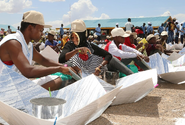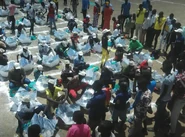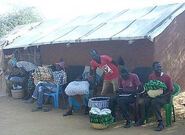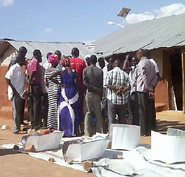|
Last edited: 8 May 2017
|
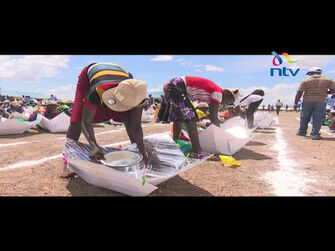
Kakuma refugee camp setting the pace in use of renewable energy
Solar Cookers International’s first and largest refugee project began in January 1995 in the Kakuma Refugee Camp located in Kenya. At the time, the camp provided a safe haven for 28,000 refugees, primarily from Sudan and Somalia. The camp also housed refugees from Ethiopia, the DRC, Burundi, Eritrea, Rwanda and Uganda. Kakuma had considerable refugee turnover, but by 2004, when Solar Cookers International (SCI) concluded the project, the camp had tripled in size to nearly 90,000 refugees. Though rapid growth posed problems for assisting all those who wanted to solar cook, SCI ultimately served over 15,000 families. Beginning in 2016, new efforts have been made to bring solar cooking back to Kakuma.
Most significant solar cooking projects
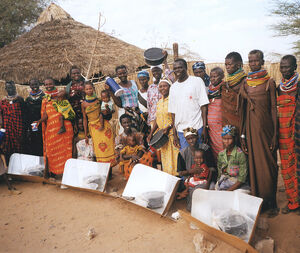
Refugees from Sudan are trained by Solar Cookers International in the use of their new CooKit solar cookers.
- A refugee camp in Kenya was the first to receive a large scale solar cooking project - The Kakuma refugee camp was formed in 1972 when Sudanese refugees first arrived in Kakuma, Kenya. Introducing solar cooking to the camp was Solar Cookers International’s first and largest refugee project, beginning in January 1995. Kakuma had considerable refugee turnover, but by 2004, when Solar Cookers International (SCI) concluded the project, the camp had tripled in size to nearly 90,000 refugees. Though rapid growth posed problems for assisting all those who wanted to solar cook, SCI ultimately served over 15,000 families. The program also extended solar cooker technology to schools, especially primary school, through demonstrations, poems, songs and drama.
News
- May 2017: SuryaKumbh heads to Kakuma, Kenya - Vivek Kabra brought the spirt of Suryakumbh, literally, a festive gathering celebrating the power of the sun, to the Kakuma refugee camp in Kenya. 500 families participated in learning to construct the Copenhagen Solar Cooker Light solar cooker, and then used them for a group meal preparation. Others helping make the project a success were Faustine Odaba and Roger Haines, who's reflective material was used in the cooker construction.
- September 2016: Renewed solar cooking workshops at Kenyan refugee camps - Solar cooking advocate, Faustine Odaba, and her daughter have been conducting solar cooking and fireless cooking workshops at the Kakuma and Dadaab refugee camps in Kenya. The has been an enthusiastic response to thee workshops as participants prepare for the time when Kenya closes the camps.
- Faustine Odaba solar cooking workshop at refugee camps in KenyaFaustine Odaba solar cooking workshop at refugee camps in KenyaFaustine Odaba solar cooking workshop at refugee camps in Kenya
- September 2012: The Swedish Church and the aid agency Lutheran World Federation (LWF) are launching Solvatten in Kakuma Refugee Camp in Kenya. The goal of the project is to reduce environmental degradation by enabling people to use alternative sources of energy in the camp and in the host community that surrounds it. Supply of firewood has been a problem in Kakuma region since the camp was set up in 1992 but it has escalated in the past two years, despite that the refugees are not allowed to harvest firewood directly from the bushes. This is attributed to the continuous massive influx of people into the camp leading to the environmental degradation through the harvesting of sticks from the available vegetation for firewood. Firewood has become very expensive and the UNHCR struggles to purchase and supply fuel to the growing population of refugees in the camp.
Reports
- May 2017: Solar Cooking—the solution to environmental impact and fuel scarcity in Kakuma Refugee Camp - Godfrey Mawira Kaburu
- February 2005: Report from Kakuma Refugee Camp - Antony Malong
- December 2003: Independent Project Evaluation - The evaluation of SCI’s Solar Cooking project at Kakuma Refugee Camp was commissioned by SCI primarily to exhaustively review the entire solar cookers project from inception to the present, in anticipation of its phase out and eventual replacement by a refugee trainer operated cooperative. The evaluation is in line with SCI’s procedures, much like other development agencies, which highlight the processes, impact and lessons learnt from development projects.

